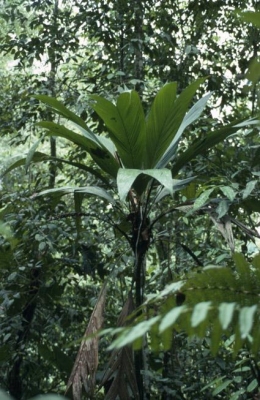Asterogyne spicata
(H.E.Moore) Wess.Boer
Arecaceae
Aristeyera spicata H.E.Moore
Common Name:

Plant growing in forest
Photograph by: John Dransfield
Image credit to Palmweb

Plant growing in forest
Photograph by: John Dransfield
Image credit to Palmweb

Close-up of crown
Photograph by: John Dransfield
Image credit to Palmweb
General Information
Asterogyne spicata is a single-stemmed, evergreen palm growing 2 - 8 metres tall. The unbranched stem can be 4 - 5cm in diameter; it is topped by a crown of around 25 leaves that can each be up to 1 metre long[
768- Title
- Field Guide to the Palms of the Americas
- Publication
-
- Author
- Henderson A.; Galeano G.; Bernal R.
- Publisher
- Princeton University Press; Princeton, New Jersey.
- Year
- 1995
- ISBN
- 0-691-08537-4
- Description
- An excellent book, giving basic information on all the 550 species of palms native to the Americas that were known in 1995. Comprehensive information on the plants range and habitat, brief description, some uses and almost 250 photos.
].
The plant is harvested from the wild as a local source of material for thatching.
The plant has a restricted range and increasing settlement has caused habitat losses in some areas. It is classified as 'Vulnerable' in the IUCN Red List of Threatened Species(2011)[
338- Title
- IUCN Red List of Threatened Species
- Publication
-
- Author
-
- Website
- http://www.iucnredlist.org/
- Publisher
-
- Year
- 0
- ISBN
-
- Description
- A list of plants under threat and facing possible extinction, usually with brief details of the threats and information on habitat.
].
Known Hazards
None known
Botanical References
768- Title
- Field Guide to the Palms of the Americas
- Publication
-
- Author
- Henderson A.; Galeano G.; Bernal R.
- Publisher
- Princeton University Press; Princeton, New Jersey.
- Year
- 1995
- ISBN
- 0-691-08537-4
- Description
- An excellent book, giving basic information on all the 550 species of palms native to the Americas that were known in 1995. Comprehensive information on the plants range and habitat, brief description, some uses and almost 250 photos.
Range
S. America - Venezuela.
Habitat
Lowland to premontane rain forest, usually on slopes, at elevations from 200 - 700 metres[
768- Title
- Field Guide to the Palms of the Americas
- Publication
-
- Author
- Henderson A.; Galeano G.; Bernal R.
- Publisher
- Princeton University Press; Princeton, New Jersey.
- Year
- 1995
- ISBN
- 0-691-08537-4
- Description
- An excellent book, giving basic information on all the 550 species of palms native to the Americas that were known in 1995. Comprehensive information on the plants range and habitat, brief description, some uses and almost 250 photos.
].
Properties
| Conservation Status | Vulnerable |
| Other Uses Rating |      |
| Habit | Evergreen Tree |
| Height | 6.00 m |
| Pollinators | Insects |
| Cultivation Status | Wild |
Cultivation Details
Not known
Edible Uses
None known
Medicinal
None known
Other Uses
The leaves are used for thatching[
768- Title
- Field Guide to the Palms of the Americas
- Publication
-
- Author
- Henderson A.; Galeano G.; Bernal R.
- Publisher
- Princeton University Press; Princeton, New Jersey.
- Year
- 1995
- ISBN
- 0-691-08537-4
- Description
- An excellent book, giving basic information on all the 550 species of palms native to the Americas that were known in 1995. Comprehensive information on the plants range and habitat, brief description, some uses and almost 250 photos.
].
Propagation
Seed -
If you have any useful information about this plant, please leave a comment. Comments have to be approved before they are shown here.
 Useful Tropical Plants Database 2014 by
Ken Fern,
web interface by
Ajna Fern
with help from
Richard Morris.
Useful Tropical Plants Database 2014 by
Ken Fern,
web interface by
Ajna Fern
with help from
Richard Morris.